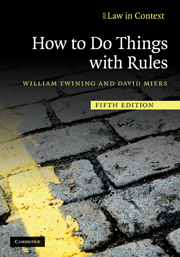Book contents
- Frontmatter
- Contents
- Preface
- Online appendices
- Acknowledgements
- Abbreviations
- Table of statutes and legislative instruments
- Table of cases
- Part I
- Part II Reading, using and interpreting rules in general
- Part III Reading law: reading, using and interpreting legislation and cases
- Part IV
- Index
- Resources on the web
- Appendix I Supplementary materials and exercises on Chapter 1
- Appendix II Normative and legal pluralism
- Appendix III Visual presentation of rules
- Appendix IV The Reading Law Cookbook
- Appendix V Supplementary materials and exercises on Chapters 7–10
- Appendix VI Supplementary materials and exercises on Chapters 9 and 11
- Appendix VII Domestic violence: a case study
- Appendix VIII MPs' expenses: a case study
- Appendix IX Hunting Act 2004: a case study
Appendix VII - Domestic violence: a case study
Published online by Cambridge University Press: 05 June 2012
- Frontmatter
- Contents
- Preface
- Online appendices
- Acknowledgements
- Abbreviations
- Table of statutes and legislative instruments
- Table of cases
- Part I
- Part II Reading, using and interpreting rules in general
- Part III Reading law: reading, using and interpreting legislation and cases
- Part IV
- Index
- Resources on the web
- Appendix I Supplementary materials and exercises on Chapter 1
- Appendix II Normative and legal pluralism
- Appendix III Visual presentation of rules
- Appendix IV The Reading Law Cookbook
- Appendix V Supplementary materials and exercises on Chapters 7–10
- Appendix VI Supplementary materials and exercises on Chapters 9 and 11
- Appendix VII Domestic violence: a case study
- Appendix VIII MPs' expenses: a case study
- Appendix IX Hunting Act 2004: a case study
Summary
Note: this Appendix contains a sequence of materials on domestic violence including extracts from the Court of Appeal and the House of Lords' judgments in Davis v. Johnson [1979] AC 264 at 272, to which we extensively refer in Chapters 2 and 6, and in Chapters 8 and 11.
Introduction
Background
The outline of the story is quite simple: largely because of the activities of and controversy surrounding Mrs Erin Pizzey and her associates in Chiswick during the early 1970s, problems of domestic violence became a focus of public attention; consequently in 1974–5 a Select Committee on ‘Violence in Marriage’ was set up by the House of Commons. After only five months it submitted a Report (on violence in marriage), which was followed shortly afterwards by a private Member's Bill on Domestic Violence. During its passage through Parliament, the Bill was supported by the government, sections 1 and 2 being redrafted by the government draftsmen and introduced during the Committee stage. It was enacted in 1976 as the Domestic Violence and Matrimonial Proceedings Act 1976. Section 1, one of its important provisions, gave rise to problems of interpretation; it gave county courts jurisdiction, on the application of a spouse or cohabitee, to grant injunctions with respect to molestation and, most significantly, occupation of the matrimonial home. For a time many injunctions were granted to applicants to exclude the spouse or partner from the matrimonial home, notwithstanding that he or she was the owner or tenant.
Information
- Type
- Chapter
- Information
- How to Do Things with Rules , pp. 487 - 525Publisher: Cambridge University PressPrint publication year: 2010
